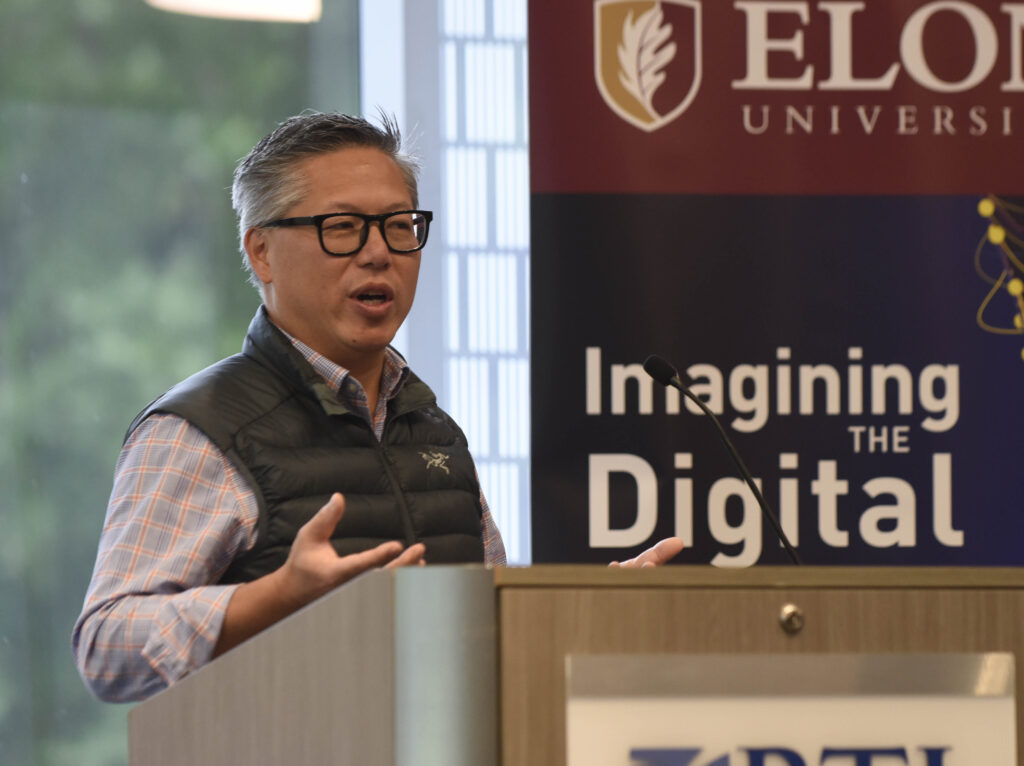In Medicine We Need Real Intelligence
September 17. 2025
By Lee Rainie
Dr. Erich Huang, a surgeon-scientist and AI researcher, argued in his keynote that medicine must reclaim its humanity even as machine learning systems transform healthcare. “We should stop calling it artificial intelligence,” he says. “What we need is real intelligence — intelligence that is ethical, embodied, and human.”
Huang illustrated that point with a story from his residency at Duke University Hospital.

“It was two in the morning when my pager went off — Level 1 trauma. A 58-year-old woman came in after a car crash, hypotensive. We placed two chest tubes. My attending whispered, ‘Don’t mess this up,’ though he didn’t use that word.”
They stabilized her, rushed her to surgery, and discovered — mercifully — that her pancreas was intact.
“Before we rolled her to the OR, her husband — himself an OB-GYN — came in and whispered something in her ear. Watching that moment nearly broke me. It reminded me of the deep humanity at the heart of medicine — something no data center, however powerful, can replicate.”
The unwritten codes of medicine
Huang noted that medicine runs on tacit knowledge: the muscle memory of experienced hands, the tiny procedural habits no one records.
He mentioned a scene from streaming series, The Pitt, that showed a doctor clipping a guidewire to the drape with a mosquito clamp — a small act every surgeon knows but no algorithm would. “Those are the things that never make it into the electronic record,” he said, and thus are not included in language models. Still, that is the kind of tacit knowledge that helps save lives.
“The real challenge in healthcare isn’t just identifying problems; it’s changing human and institutional behavior,” he argued. And Huang was clear that much of modern medicine is not organized to facilitate good care and cures: “Our data systems reflect our incentives. The electronic health record isn’t a reflection of biology — it’s a reflection of billing. ICD-10 codes exist for reimbursement, not for understanding disease.”
Until medicine aligns its incentives around outcomes rather than revenue, he said, algorithms will continue to replicate flawed assumptions.
He emphasized that the best doctors are not just technical experts but diplomats — people who treat patients, nurses, respiratory therapists, and colleagues with respect and empathy. Those human skills, he said, often correlate with better outcomes.
“AI doesn’t yet do diplomacy,” he quipped. “And it doesn’t know how to call the ENT down to the ER at midnight.”
The religion of Silicon Valley
Working now within a technology company, Huang has observed what he calls “a near-religious faith in AI.”
“There’s a mystical belief that it will redeem all our failures,” he said. “But AI is normal technology” that will take a long time to work its way into the everyday lives of people. He cited Princeton’s Arvind Narayanan, who argued in a recent paper that AI’s diffusion will follow the slow, uneven curves of earlier technologies. “Edison’s light bulb took fifty years to reach rural America,” Huang noted. “Even autonomous cars — a much simpler problem — still haven’t arrived.”
He echoed Meta AI chief Yann LeCun’s critique of large language models, which LeCun says lack four key capacities: understanding the physical world, persistent memory, reasoning, and complex planning.
“What we need,” Huang said, “are world models, not word models. Real intelligence understands the physical world and acts within it.”
As a practical step, he proposed that data scientists and software engineers take clinical rotations. “They need to see what taking care of human beings really looks like,” he said. “To understand that death is more than a Boolean variable — that life isn’t just a zero or one.”
The closing call to action
“We need to change the conversation,” he said. “We should move beyond the artifice of artifice of intelligence and focus on what’s real.”
Medicine, he insisted, must remain a human endeavor; enhanced but never replaced by machines.
“The goal isn’t to make care artificial,” Huang said. “It’s to make it more real.”


